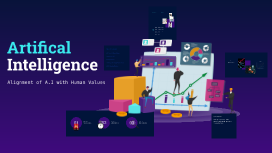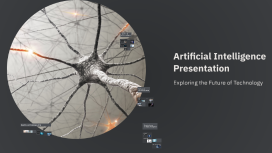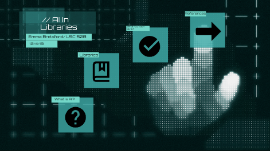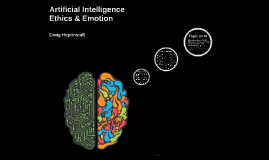Artificial Intelligence Presentation
Transcript: Emma Brelsford/ LSC 508 Libraries 12/4/19 What has been done? // AI In Libraries What is AI? What is AI? Like the field of information science, there are many different definitions of AI Simple definition from Lexico: "the theory and development of computer systems able to perform tasks that normally require human intelligence, such as visual perception, speech recognition, decision-making, and translation between languages" (Lexico, 2019) Defined in regards to it's goals: (Bringsjord, Selmer, Govindarajulu, Sundar, 2019) Relation to libraries Information retrieval Effects both librarians and patrons Catherine Coleman the Digital Research Architect at Stanford University Libraries states "Considering the profound change AI can bring as power tools for scholarship, making our vast library collections discoverable, searchable, and analyzable in new ways. How best do we bring the skills and knowledge of library staff, scholars, and students together to design an intelligent information system that respects the sources, engages critical inquiry, fosters imagination, and supports human learning and knowledge creation" (Coleman, 2017) (Pixabay, 2018) What has been done? Hugh the Library Assitant- Aberystwyth University, Wales Robbie Library Inventory Robot- Temasek Polytechnic Library, Singapore URI AI Lab in Library (The University of Rhode Island, 2018) (Thinking Machine, 2016) (Temasek Polytechnic Library, 2018) References References “AI Lab.” AI Lab, University of Rhode Island , web.uri.edu/ai/. Bringsjord, Selmer and Govindarajulu, Naveen Sundar, "Artificial Intelligence", The Stanford Encyclopedia of Philosophy (Winter 2019 Edition), Edward N. Zalta (ed.), https://plato.stanford.edu/entries/artificial-intelligence/ Coleman, C. (2017), “Artificial intelligence and the library of the future, revisited”, Stanford Libraries, available at:https://library.stanford.edu/blogs/digital-library-blog/2017/11/artificial-intelligence-and-library-future-revisited "Hugh Library Assistant A.I. Robot Aberystwyth University.” YouTube, Thinking Machine , 8 Nov. 2016, www.youtube.com/watch?v=usW8dNsP6Cw. "Library Inventory Robot .” Youtube , Temasek Polytechnic Library , 31 Oct. 2018, www.youtube.com/watch?v=OutMC5pjhkI. Massis, B. (2018). Artificial intelligence arrives in the library. Information and Learning Science, 119(7), 456-459. doi:http://dx.doi.org.uri.idm.oclc.org/10.1108/ILS-02-2018-0011

















